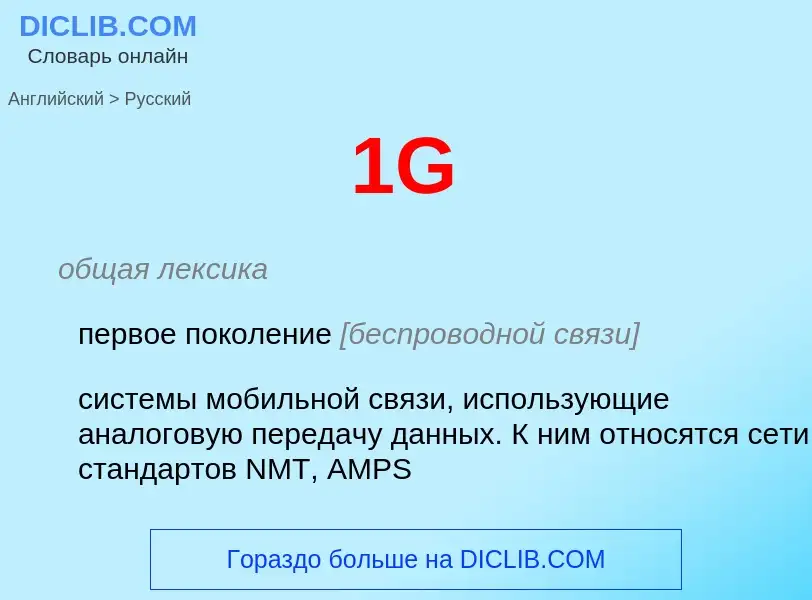Translation and analysis of words by ChatGPT artificial intelligence
On this page you can get a detailed analysis of a word or phrase, produced by the best artificial intelligence technology to date:
- how the word is used
- frequency of use
- it is used more often in oral or written speech
- word translation options
- usage examples (several phrases with translation)
- etymology
1G - translation to russian
общая лексика
FC
стандарт Fibre Channel
стандарт ANSI на передачу данных, высокоскоростная пятиуровневая (FC-0...FC4) оптоволоконная сетевая архитектура, поддерживающая скорости передачи 133, 266, 530 и 1060 Мбит/с. Развитием стандарта занимается ассоциация FCIA
Смотрите также
[flaiiŋ'fɔ:tris]
авиация
бомбардировщик «летающая крепость»
Definition
Wikipedia
1G refers to the first generation of cellular network (wireless) technology. These are mobile telecommunications standards that were introduced in the 1980s and were superseded by 2G. The main difference between these two mobile cellular generations is that the audio transmissions of 1G networks were analog, while 2G networks were entirely digital.
There were many different 1G cellular standards developed and used in different countries, but the most widely adopted globally were the Nordic Mobile Telephone (NMT) and Advanced Mobile Phone System (AMPS) systems. The inherent advantages of digital technology over that of analog meant that 2G networks went on to eventually completely replace them. Many 1G networks were switched off in developed economies by 2000, but in some places networks continued to operate into the 2010s.

![Fibre Channel director with SFP+ modules and LC [[optical fiber connector]]s with Optical M<nowiki/>ultimode 3 (OM3) fiber (aqua<nowiki/>). Fibre Channel director with SFP+ modules and LC [[optical fiber connector]]s with Optical M<nowiki/>ultimode 3 (OM3) fiber (aqua<nowiki/>).](https://commons.wikimedia.org/wiki/Special:FilePath/Fibre Channel Director.jpg?width=200)






.jpg?width=200)
![Bf 109 fighter]], eventually landing without crew injuries. Bf 109 fighter]], eventually landing without crew injuries.](https://commons.wikimedia.org/wiki/Special:FilePath/19430201AllAmericanB17inFlight.jpg?width=200)
 bombers at the airfield of Boeing's Seattle plant. The ship will... - NARA - 196372.jpg?width=200)
![Pearl Harbor]], with framed nose glazing of the style retained through the B-17E model Pearl Harbor]], with framed nose glazing of the style retained through the B-17E model](https://commons.wikimedia.org/wiki/Special:FilePath/B-17B Bombers at March Field, California prior to 7 December 1941.jpg?width=200)
![gondola]] gondola]]](https://commons.wikimedia.org/wiki/Special:FilePath/B-17C with RAF colors.jpg?width=200)







![15 October}} 1944; the bombardier was killed.<ref>[http://www.398th.org/Images/Images_Aircraft_B-17/Aircraft/43-38172-3O-P_19441015_JBk.html "43-38172."] ''398th.org''. Retrieved: 24 January 2012.</ref> 15 October}} 1944; the bombardier was killed.<ref>[http://www.398th.org/Images/Images_Aircraft_B-17/Aircraft/43-38172-3O-P_19441015_JBk.html "43-38172."] ''398th.org''. Retrieved: 24 January 2012.</ref>](https://commons.wikimedia.org/wiki/Special:FilePath/B-17 Damage Cologne.jpg?width=200)
![Formation flying through dense [[flak]] over [[Merseburg]], Germany Formation flying through dense [[flak]] over [[Merseburg]], Germany](https://commons.wikimedia.org/wiki/Special:FilePath/B-17 Schweinfurt.jpg?width=200)
![Nose of a B-17G being restored at the [[Mighty Eighth Air Force Museum]] Nose of a B-17G being restored at the [[Mighty Eighth Air Force Museum]]](https://commons.wikimedia.org/wiki/Special:FilePath/B-17 at Mighty 8th Air Force Museum, Pooler, GA, US.jpg?width=200)
![Douglas]] plant in [[Long Beach, California]], October 1942 Douglas]] plant in [[Long Beach, California]], October 1942](https://commons.wikimedia.org/wiki/Special:FilePath/B17F - Woman workers at the Douglas Aircraft Company plant, Long Beach, Calif.jpg?width=200)



![Postwar SB-17G-95DL (ser. no. ''44-83722''), assigned to the 2nd ERS as a search-and-rescue aircraft, beside a [[Stinson L-5]] Postwar SB-17G-95DL (ser. no. ''44-83722''), assigned to the 2nd ERS as a search-and-rescue aircraft, beside a [[Stinson L-5]]](https://commons.wikimedia.org/wiki/Special:FilePath/Boeing SB-17G.jpg?width=200)







![[[Forrest L. Vosler]] receiving Medal of Honor from President Roosevelt [[Forrest L. Vosler]] receiving Medal of Honor from President Roosevelt](https://commons.wikimedia.org/wiki/Special:FilePath/Forrest-L-Vosler.png?width=200)
![398th Bombardment Group]] flying a bombing mission to [[Neumünster]], Germany, on 13 April 1945. 398th Bombardment Group]] flying a bombing mission to [[Neumünster]], Germany, on 13 April 1945.](https://commons.wikimedia.org/wiki/Special:FilePath/Living Legends.jpg?width=200)

![Maynard H. Smith]] receiving Medal of Honor from [[Secretary of War]] [[Henry L. Stimson]] Maynard H. Smith]] receiving Medal of Honor from [[Secretary of War]] [[Henry L. Stimson]]](https://commons.wikimedia.org/wiki/Special:FilePath/Maynard-H-Smith.png?width=200)

![WASP]]<ref name="museum2" /> WASP]]<ref name="museum2" />](https://commons.wikimedia.org/wiki/Special:FilePath/Nancy Love and Betty Gillies.jpg?width=200)
![Liberty Belle]]", but was lost in a post-forced-landing fire near [[Oswego, Illinois]], on 13 June 2011. Liberty Belle]]", but was lost in a post-forced-landing fire near [[Oswego, Illinois]], on 13 June 2011.](https://commons.wikimedia.org/wiki/Special:FilePath/Pratt-Whitney T-34 B-17 testbed NAN10-50.jpg?width=200)



![Under project '''Cadillac II''', an AN/APS-20 radar was fitted onto the B-17G, making the PB-1W one of the first [[Airborne early warning]] aircraft. Under project '''Cadillac II''', an AN/APS-20 radar was fitted onto the B-17G, making the PB-1W one of the first [[Airborne early warning]] aircraft.](https://commons.wikimedia.org/wiki/Special:FilePath/US Navy PB-1W.jpg?width=200)

